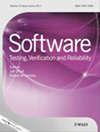Model checking C++ programs
IF 1.2
4区 计算机科学
Q3 COMPUTER SCIENCE, SOFTWARE ENGINEERING
引用次数: 13
Abstract
In the last three decades, memory safety issues in system programming languages such as C or C++ have been one of the most significant sources of security vulnerabilities. However, there exist only a few attempts with limited success to cope with the complexity of C++ program verification. We describe and evaluate a novel verification approach based on bounded model checking (BMC) and satisfiability modulo theories (SMT) to verify C++ programs. Our verification approach analyses bounded C++ programs by encoding into SMT various sophisticated features that the C++ programming language offers, such as templates, inheritance, polymorphism, exception handling, and the Standard Template Libraries. We formalize these features within our formal verification framework using a decidable fragment of first‐order logic and then show how state‐of‐the‐art SMT solvers can efficiently handle that. We implemented our verification approach on top of ESBMC. We compare ESBMC to LLBMC and DIVINE, which are state‐of‐the‐art verifiers to check C++ programs directly from the LLVM bitcode. Experimental results show that ESBMC can handle a wide range of C++ programs, presenting a higher number of correct verification results. Additionally, ESBMC has been applied to a commercial C++ application in the telecommunication domain and successfully detected arithmetic‐overflow errors, which could potentially lead to security vulnerabilities.模型检查c++程序
在过去的三十年中,系统编程语言(如C或c++)中的内存安全问题一直是安全漏洞的最重要来源之一。然而,在处理c++程序验证的复杂性方面,只有少数几次尝试取得了有限的成功。本文描述并评估了一种基于有界模型检验(BMC)和可满足模理论(SMT)的验证c++程序的新方法。我们的验证方法通过将c++编程语言提供的各种复杂特性(如模板、继承、多态性、异常处理和标准模板库)编码到SMT中来分析有界的c++程序。我们在我们的形式化验证框架中使用一阶逻辑的可确定片段形式化这些特征,然后展示最先进的SMT求解器如何有效地处理这些特征。我们在ESBMC之上实现了验证方法。我们将ESBMC与LLBMC和DIVINE进行比较,它们是最先进的验证器,可以直接从LLVM位码检查c++程序。实验结果表明,ESBMC可以处理大量的c++程序,给出了较高的正确率验证结果。此外,ESBMC已应用于电信领域的商业c++应用程序,并成功检测到可能导致安全漏洞的算术溢出错误。
本文章由计算机程序翻译,如有差异,请以英文原文为准。
求助全文
约1分钟内获得全文
求助全文
来源期刊

Software Testing Verification & Reliability
工程技术-计算机:软件工程
CiteScore
3.70
自引率
0.00%
发文量
34
审稿时长
>12 weeks
期刊介绍:
The journal is the premier outlet for research results on the subjects of testing, verification and reliability. Readers will find useful research on issues pertaining to building better software and evaluating it.
The journal is unique in its emphasis on theoretical foundations and applications to real-world software development. The balance of theory, empirical work, and practical applications provide readers with better techniques for testing, verifying and improving the reliability of software.
The journal targets researchers, practitioners, educators and students that have a vested interest in results generated by high-quality testing, verification and reliability modeling and evaluation of software. Topics of special interest include, but are not limited to:
-New criteria for software testing and verification
-Application of existing software testing and verification techniques to new types of software, including web applications, web services, embedded software, aspect-oriented software, and software architectures
-Model based testing
-Formal verification techniques such as model-checking
-Comparison of testing and verification techniques
-Measurement of and metrics for testing, verification and reliability
-Industrial experience with cutting edge techniques
-Descriptions and evaluations of commercial and open-source software testing tools
-Reliability modeling, measurement and application
-Testing and verification of software security
-Automated test data generation
-Process issues and methods
-Non-functional testing
 求助内容:
求助内容: 应助结果提醒方式:
应助结果提醒方式:


